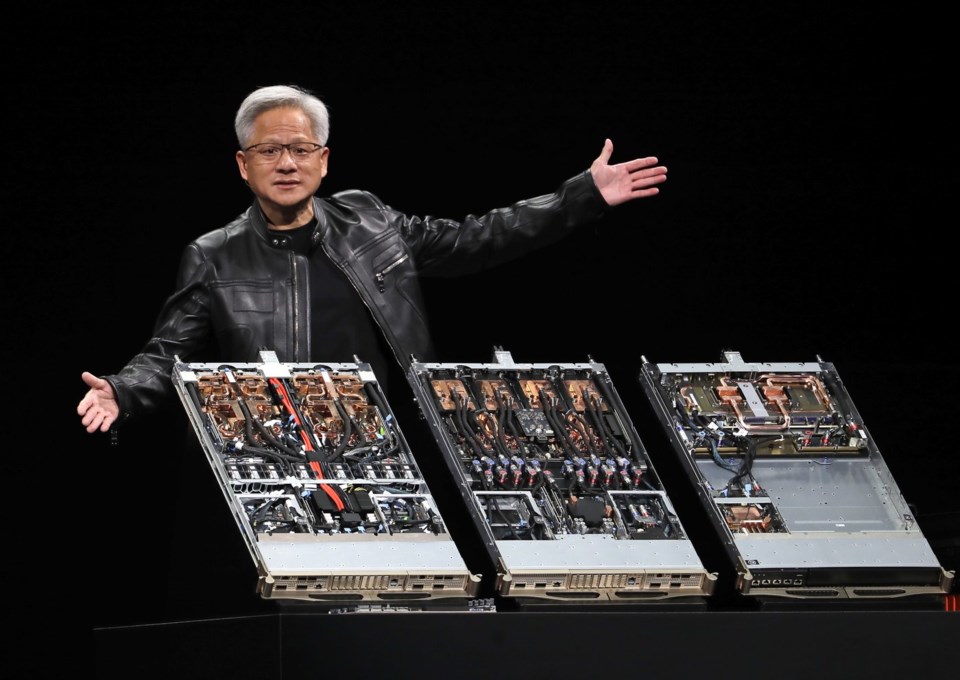BANGKOK (AP) — Nvidia’s CEO Jensen Huang says the technology giant has won approval from the Trump administration to sell its advanced H20 computer chips used to develop artificial intelligence to China.
The news came in a company blog post late Monday, which stated that the U.S. government had “assured" Nvidia that licenses would be granted — and that the company “hopes to start deliveries soon.” Shares of the California-based chipmaker were up over 4% by midday Tuesday.
Huang also spoke about the coup on China’s state-run CGTN television network, in remarks shown on X.
“Today, I'm announcing that the U.S. government has approved for us filing licenses to start shipping H20s,” Huang told reporters in Beijing.
He added that half of the world's AI researchers are in China. “It's so innovative and dynamic here in China that it's really important that American companies are able to compete and serve the market here," he said.
Huang recently met with President Donald Trump and other U.S. policymakers — and is in Beijing this week to attend a supply chain conference and speak with Chinese officials. The broadcast showed Huang meeting with Ren Hongbin, the head of the China Council for Promotion of International Trade, host of the China International Supply Chain Expo, which Huang was attending. Nvidia is an exhibitor.
Nvidia has profited enormously from the rapid adoption of AI, becoming the first company to have its market value surpass $4 trillion last week. However, the trade rivalry between the U.S. and China has been weighing heavily on the industry.
Here's what we know.
What is Nvidia's H20 chip?
The H20 graphics processing unit, or GPU, is an advanced AI chip — a type of device used to build and update a range of AI systems. But it's less powerful than Nvidia's top semiconductors today.
That's because the H20 chip was developed to specifically comply with U.S. restrictions for exports of AI chips to China. Nvidia's most advanced chips, which carry more computing power, are off-limits to the Chinese market.
Washington has been tightening controls on exports of advanced technology to China for years, citing concerns that know-how meant for civilian use could be deployed for military purposes. And in January, before Trump began his second term in office, President Joe Biden's administration launched a new framework for exporting advanced computer chips used to develop AI — in an attempt to balance national security concerns about the technology with the economic interests of producers and other countries.
Restrictions on sales of advanced chips to China have been central to the AI race between the world's two largest economic powers, but such controls are also controversial. Proponents argue that these restrictions are necessary to slow China down enough to allow U.S. companies to keep their lead. Meanwhile, opponents say the export controls have loopholes — and could still spur innovation. The emergence of China’s DeepSeek AI chatbot in January particularly renewed concerns over how China might use advanced chips to help develop its own AI capabilities.
What's happened since Trump took office?
In April, just months after Trump took office, the White House announced that it would restrict sales of Nvidia’s H20 chips to China — as well as MI308 chips from rival chipmaker Advanced Micro Devices.
At the time, the Trump administration again cited national security. But Nvidia said these tighter export controls would cost the company an extra $5.5 billion — and Huang and other technology leaders have been lobbying Trump to reverse the restrictions since. They've argued that such limits hinder U.S. competition in a sector in one of the world’s largest markets for technology, and have also warned that U.S. export controls could end up pushing other countries toward China’s AI technology.
Monday's announcement from Nvidia signals that its lobbyingefforts paid off — although the Trump administration has yet to publicly comment on the future of H20 chip sales in China. And the exact timing remains unknown overall. It's also unclear whether AMD will similarly see restrictions lifted for its MI308 chips. AMD didn’t immediately return an emailed request for comment Tuesday about how Trump’s policies would affect its chip sales in China.
On top of export controls, California-based Nvidia — like other tech giants today — has been caught in the crosshairs of Trump’s tariff wars abroad, particularly amid America's tit-for-tat levies with China. But Nvidia and its CEO have garnered Trump’s favor in recent months. In April, the company announced that it would be producing its AI chips in the U.S. for the first time, starting with more than one million square feet of manufacturing space to build and test its specialized Blackwell chips in Arizona and AI supercomputers in Texas.
Trump was quick to applaud Nvidia's move. He introduced Huang as a “smart cookie” who was helping bring jobs to the U.S. at an “Investing in America” event held at the White House later that month.
___
Grantham-Philips reported from New York. AP Writers Didi Tang in Washington, D.C., Matt O'Brien in Providence, Rhode Island and AP researcher Yu Bing in Beijing contributed.
Elaine Kurtenbach And Wyatte Grantham-philips, The Associated Press



